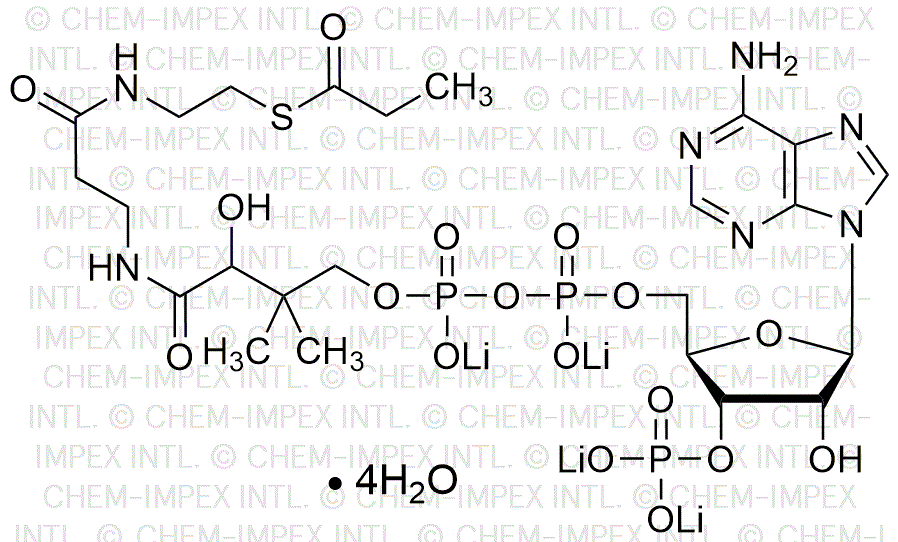Propionyl coenzyme A lithium salt is widely utilized in research focused on:
- Metabolic Studies: This compound plays a crucial role in studying metabolic pathways, particularly in energy production and fatty acid metabolism, helping researchers understand cellular processes.
- Drug Development: It serves as a valuable intermediate in synthesizing pharmaceuticals, particularly in developing medications targeting metabolic disorders, enhancing drug efficacy.
- Biochemical Assays: Used in various assays to measure enzyme activity related to coenzyme A, it aids in understanding enzyme kinetics and regulation in biochemical research.
- Genetic Research: The compound is instrumental in genetic studies, particularly those exploring gene expression related to metabolic enzymes, facilitating advancements in gene therapy.
- Food Industry Applications: It can be applied in food science to study flavor compounds and their interactions, contributing to the development of enhanced food products.
General Information
Properties
Safety and Regulations
Applications
Propionyl coenzyme A lithium salt is widely utilized in research focused on:
- Metabolic Studies: This compound plays a crucial role in studying metabolic pathways, particularly in energy production and fatty acid metabolism, helping researchers understand cellular processes.
- Drug Development: It serves as a valuable intermediate in synthesizing pharmaceuticals, particularly in developing medications targeting metabolic disorders, enhancing drug efficacy.
- Biochemical Assays: Used in various assays to measure enzyme activity related to coenzyme A, it aids in understanding enzyme kinetics and regulation in biochemical research.
- Genetic Research: The compound is instrumental in genetic studies, particularly those exploring gene expression related to metabolic enzymes, facilitating advancements in gene therapy.
- Food Industry Applications: It can be applied in food science to study flavor compounds and their interactions, contributing to the development of enhanced food products.
Documents
Safety Data Sheets (SDS)
The SDS provides comprehensive safety information on handling, storage, and disposal of the product.
Product Specification (PS)
The PS provides a comprehensive breakdown of the product’s properties, including chemical composition, physical state, purity, and storage requirements. It also details acceptable quality ranges and the product's intended applications.
Certificates of Analysis (COA)
Search for Certificates of Analysis (COA) by entering the products Lot Number. Lot and Batch Numbers can be found on a product’s label following the words ‘Lot’ or ‘Batch’.
*Catalog Number
*Lot Number
Certificates Of Origin (COO)
This COO confirms the country where the product was manufactured, and also details the materials and components used in it and whether it is derived from natural, synthetic, or other specific sources. This certificate may be required for customs, trade, and regulatory compliance.
*Catalog Number
*Lot Number
Safety Data Sheets (SDS)
The SDS provides comprehensive safety information on handling, storage, and disposal of the product.
DownloadProduct Specification (PS)
The PS provides a comprehensive breakdown of the product’s properties, including chemical composition, physical state, purity, and storage requirements. It also details acceptable quality ranges and the product's intended applications.
DownloadCertificates of Analysis (COA)
Search for Certificates of Analysis (COA) by entering the products Lot Number. Lot and Batch Numbers can be found on a product’s label following the words ‘Lot’ or ‘Batch’.
*Catalog Number
*Lot Number
Certificates Of Origin (COO)
This COO confirms the country where the product was manufactured, and also details the materials and components used in it and whether it is derived from natural, synthetic, or other specific sources. This certificate may be required for customs, trade, and regulatory compliance.


